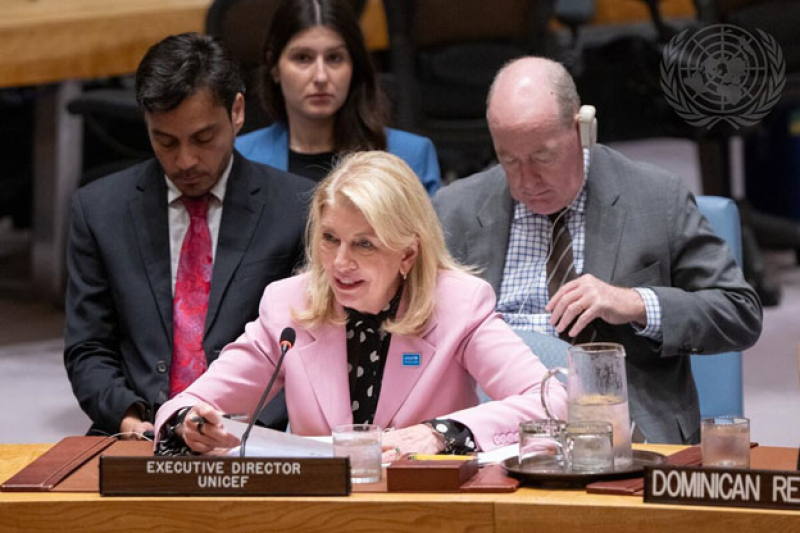- A Day of People-Centered Food System Storytelling! |
- No evidence of postal ballot irregularities found: EC Sanaullah |
- Bangladesh Bank injects Tk 9,178 crore to ease liquidity strain |
- No LPG Shortage Expected During Ramadan: BERC Chairman |
UN Warns Haiti Crisis Deepens Amid Gang Violence, Aid Shortages

Catherine Russell, Executive Director of UNICEF, briefs the Security Council meeting on the current humanitarian situation in Haiti.
In recent months, the humanitarian crisis in Haiti has worsened, with armed gangs continuing to dominate nearly 90 percent of the capital, Port-au-Prince. Rising violence, the collapse of essential services for millions, and severe cuts to humanitarian funding have left the international community struggling to provide immediate relief and find sustainable, long-term solutions.
Figures from the United Nations Integrated Office in Haiti (BINUH) show that the security situation in Port-au-Prince remained volatile in the second quarter of 2025, with hostilities rising outside the capital as well. Between April 1 and June 30, at least 1,520 civilians were killed and 609 injured, primarily in the Port-au-Prince metropolitan area, followed by Artibonite and the Centre Department.
Approximately 12 percent of civilian casualties resulted from violent clashes between gang members and self-defense groups or civilians linked to the Bwa-Kalé movement. Around 73 percent of summary executions involved members of the police force and the government commissioner of Miragoâne.
During a UN Security Council session on August 28, UNICEF Executive Director Catherine Russell addressed the worsening impact of gang violence on Haitian children. She reported a 54 percent increase in killings and maiming and a 25 percent increase in human rights violations in the first quarter of 2025 compared to the same period in 2024.
Russell also noted that new armed coalitions and more sophisticated technology, including explosive weapons, have intensified violent clashes, causing additional civilian casualties. BINUH reports that approximately 64 percent of civilian casualties occurred during security force operations against armed gangs, with 15 percent being innocent civilians at home or on the street.
UN Secretary-General António Guterres informed the Security Council that roughly six million Haitians are in dire need of humanitarian assistance. Nearly 1.3 million Haitians have been displaced nationwide due to rampant violence, half of them children.
Armed groups continue to obstruct humanitarian access, causing a near-total collapse of essential services. Millions are left without adequate healthcare, and attacks on schools have disrupted the education of around 243,000 children. Approximately 1.7 million people risk receiving no humanitarian assistance. Haiti now ranks among the world’s top five hunger hotspots and remains the least-funded humanitarian appeal. The World Food Programme reports that roughly 5.7 million Haitians face acute hunger, with 2 million at emergency levels of food insecurity.
UNICEF estimates a nearly 700 percent increase in child recruitment into gangs, with children comprising roughly 50 percent of gang members. These figures only include verified cases, and the true numbers are likely higher.
“Children are forced into combat roles, serve as couriers, lookouts, or porters, or are exploited for domestic labor, exposing them to grave and lasting physical and psychological harm,” said Russell.
During the second quarter of 2025, BINUH recorded 185 kidnappings and 628 cases of gender-based violence, including gang rapes and widespread sexual exploitation, slavery, and child trafficking. UN Spokesperson Stéphane Dujarric noted that one in seven gender-based violence survivors is a girl under 18. Roughly half involve internally displaced people, with only a quarter accessing medical care within 48 hours. Severe stigma and lack of resources prevent most victims from receiving psychosocial support and justice.
The crisis has been worsened by significant reductions in international funding, particularly from the U.S., historically Haiti’s largest donor. Budget cuts in 2025 forced several humanitarian organizations to suspend or reduce lifesaving operations.
Acting U.S. Permanent Representative to the UN Dorothy Shea announced that the U.S. seeks UN authorization for a new gang suppression force. The proposed 5,500-strong Kenya-led multinational force would partner with Haiti’s government for 12 months, securing infrastructure and assisting in controlling arms trafficking.
“The next international force must be resourced to hold territory, secure infrastructure, and complement the Haitian National Police. A comprehensive approach is required to disrupt gang financing, arms trafficking, and other illicit flows fueling instability,” Shea said.

